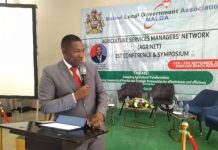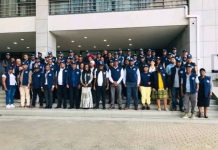Africa-Press – Malawi. In Malawi and world over, people rely on aquatic ecosystems such as Lake Chilwa to provide them with food, income, livelihoods and services such as flood control and regulation of surrounding climates.
This is in line with 10 targets within Sustainable Development Goal (SDG) 14; five of which deal with fisheries and how humans can use aquatic resources to build the future we want.
We have to be mindful of other equally sustainable development goals, namely ending poverty, ending hunger, good health, quality education and climate change.
It is apparent that SDG target 14.4 aims to effectively regulate harvesting and contain overfishing, illegal, unreported, and unregulated fishing and destructive fishing practices.
Trade-offs, compromises
The primary challenge of fisheries management is to balance food security, livelihood needs of people and sustainability of the resource. Malawi Government and development partners have been working in managing these trade-offs so that fisheries resources benefit people and the economy in a sustainable manner.
One of the development partners is the United States Agency for International Development (USAid) which has been supporting the sector through the Fisheries Integration of Society and Habitats Project (Fish), which ran from 2014 to 2019 and through the Restoring Fisheries for Sustaining Livelihoods in Lake Malawi (Refresh) Project, which runs from 2019 to 2024.
The fish/refresh approach to fisheries management has been that of creation of legal structures such as beach village committees. In partnership with the Fisheries Department, they are sustaining local structures and community organisations to implement these legal frameworks.
We now know that the first step in achieving SDG 14.4 is the creation of governance structures that support sustainable management in fishery resources. This is what has been the focus of fish/refresh and now the communities are reaping the benefits.
Science to manage deep pools
Fish/refresh mapped and used participatory management of deep pools during a 2018 assessment and was very important during Lake Chilwa recession. The pools acted as habitats, feeding and spawning ground for aquatic biodiversity leading to phenomenal recovery of fish.
A clear observation on the lake shows participatory fisheries management as the best way of sustaining aquatic biodiversity and endangered species in Lake Chilwa basin.
Management of aquatic vegetation
Management of aquatic vegetation on Lake Chilwa has played a vital role in maintaining the overall integrity of aquatic ecosystems. Aquatic vegetation stabilises Lake Chilwa ecosystems by reducing nutrient concentrations and shoreline erosion, providing food and habitat for fauna, and increasing water quality and producing oxygen.
Better managed aquatic vegetation ensures protection of juvenile fish from fishers. Submerged vegetation, in particular, is providing refuge for algae-eating zooplankton and indirectly contributing to fish growth and recruitment by increasing and diversifying invertebrate communities, protection from predation by reducing some predators’ visibility and manoeuvrability.
Fish/refresh, in partnership with the Government of Malawi, has been working to ensure conservation of the lake and wetlands. As a site of international importance under the Ramsar Convention, it is an important ecosystem for migratory birds, but also a major source of fish products in the region.
Governance structures
Governance structures have been central in sustainable management of water resources in pools. The integration of scientific knowledge and indigenous knowledge and traditional beliefs has been pivotal in managing endemic fish species.
The involvement of local leaders in policy formulation regarding integrated water resource management is paramount, in order to achieve sustainable use and management of the ecosystem.
Illegal mesh sizes, observance of closed season
The fight against illegal fishing activities is well intensified. Legal mesh sizes and observance of closed fishing season has led to positive gains. The closed season is being implemented in combination with effective enforcement of existing laws, including but not limited to mesh-size control and strict enforcement of the law.
Governance reforms such as formulation of by-laws and development of management plans in a decentralised framework have been essential in managing fish species of Lake Chilwa. Fish/refresh facilitated strengthening of participatory fisheries management regimes.
This was achieved through formulation and sustainability of strong local fisheries management institutions for devolution of fisheries management and enforcement of fisheries regulations such as ban of under-meshed and destructive gears. It was very interesting to see that the structures were intact.
Nutritional value of fish
The nutritional value of various fish species is threefold. Firstly, fish (particularly small fish) are rich sources of many important nutrients including minerals, vitamins, essential fatty acids, and high-quality protein.
Many of these nutrients found in fish are particularly important for children’s growth and development and cognition. Small fish, eaten whole, with head, organs and bones, are particularly rich in calcium and several other micro-nutrients such as vitamin A, iron, and zinc.
Secondly, the nutrients found in fish are highly bio-available, meaning they are easily absorbed compared to the same nutrients found in plant-source foods. Third, fish possesses what is termed ‘the meat-factor’, which seems to enhance absorption of nutrients from other foods in a meal.
The recovery of fish stocks and high productivity of the lake ensure the local communities have more income and Malawians reap the nutritional benefits that come with increased fish production. Sound science and good governance has been key to the recovery of fish productivity in Lake Chilwa basin.
James Banda is a fisheries research officer based in Monkey Bay, Mangochi
For More News And Analysis About Malawi Follow Africa-Press






